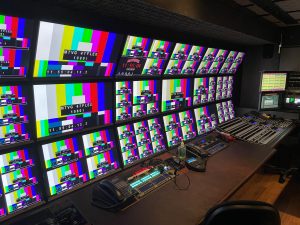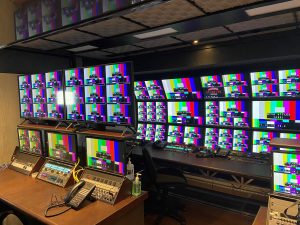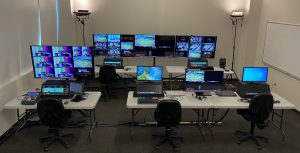Mobile TV Group Reflects on Launch of 47 Flex Mobile Unit, Looks Ahead to New Cloud Control Platform
Pandemic accelerates development of remote-production workflow
Story Highlights
Earlier this year, Mobile TV Group (MTVG) rolled out its latest SMPTE ST 2110 IP-based mobile unit, 47 Flex and 47 VMU, for the recently launched Marquee Sports Network in Chicago. The double-trailer dual-feed truck, which served Marquee’s Chicago Cubs productions this season, went live just as MTVG launched another addition to its portfolio: the Cloud Control remote-production platform.
“We have been developing this for several years, but it was clear to us [when the pandemic hit] that the industry was going to be looking for new approaches more than ever,” says MTVG CEO Philip Garvin. “Even with the impact of world feeds and costs and travel having to be reduced [as a result of the pandemic], we knew that the same production quality had to be maintained. So right away in March, we accelerated our work around Cloud Control, and the demonstrations with our network partners have gone amazingly well.”
47 Flex Arrives in Chi-Town for Opening Day
Marquee Sports Network, which launched in February and began live broadcasts of Cubs games in July, when the MLB season finally began, was looking to create state-of-the-art facilities — both at its home studio and in its mobile unit at Wrigley Field. With that in mind, Marquee tapped Mobile TV Group to build 47 Flex, an end-to-end native-IP mobile unit based fully on the latest SMPTE ST 2110 IP standards.

MTVG’s new 47 Flex IP mobile unit handled Marquee Sports Network’s Chicago Cubs broadcasts this season.
“It was exciting to be working with Marquee because they were starting from ground zero and everything was brand new,” says MTVG COO Nick Garvin. “They were able to start from scratch, and we worked with them through the entire process. It’s totally custom to Marquee, and we’re really proud of that.”
47 Flex and 47 VMU (visitor mobile unit) represent MTVG’s third all-IP mobile unit, following 45 Flex/VMU and 46 Flex. Under MTVG’s dual-feed model, portions of the equipment and resources in the 47 Flex A unit are also available to the visitor feed. The VMU trailer is fully networked to the A unit with extensive fiber connectivity, and all cameras and record trains are available to both trailers.
“It’s the IP-based infrastructure that is the real difference-maker especially during this pandemic,” Deborah Schneider, VP, technical operations, Marquee Sports Network, told SVG this summer. “Nick Garvin and his team of engineers built this mobile unit with a powerful [equipment complement], giving us numerous options in the way we produce games.
“Being able to generate content, share files, and fully integrate with our studio has given us an edge we may not otherwise have had,” she continued. “Additionally, using cloud-based technology, we have the flexibility to pull any of the operator positions within the truck to remote locations if it becomes necessary to do so as a result of the pandemic.”
47 Flex is built around a Grass Valley Kayenne K-Frame X IP switcher (7M/E, 96 inputs/48 outputs) and 384-port Evertz EXE 2.0 IP router (with up to 9,600 Gbps) and features four 12-channel EVS XT-VIA IP full-editing replay servers (plus a four-channel EVS XS VIA server for SpotBox) and a 64-fader Calrec Artemis Beam audio console (256 routable inputs via IP, 64 analog inputs/64 analog outputs).
The truck rolls with four Sony HDC-5500 fiber cameras (with SSMO) and seven HDC-3500 fiber cameras (plus Grass Valley LDK 80003G Elite triax cameras for the booth) — all with Fujinon lenses.
“This is our third all-IP mobile unit, but it’s the first [in which] the native device-to-device IP connection is made through NMOS-04 and -05,” says Phil Garvin. “That is huge because it reduces the installation and coordination time for an IP truck dramatically. That’s the big change here. It’s getting close to the point of plug-and-play, where you can connect two IP devices and they just talk to each other. There’s no question that native IP has been difficult, but it’s now getting easier with advancements we’ve made.”
MTVG is currently building 48 Flex and 48 VMU at its plant in Denver (using strict safety protocols) with plans to roll out in late 2020. Nick Garvin adds that “it has been an extremely challenging year, but MTVG remains on solid footing. The teamwork and dedication of our staff has been incredible. The harder things got, the more everyone stepped up.”
Cloud Control on the Horizon
While MTVG is rolling out new mobile units, the company is also looking to the future with its recently launched Cloud Control platform. The remote-production workflow enables production personnel normally in the mobile unit to work at their network offices. Cloud Control unlocks low-latency remote control to produce games with unlimited sources and replay (including 30+ cameras, super-slo-mo, 4K) and a control room that MTVG says can be assembled in a day for as low as $20,000 (depending on feature set).
“Our biggest reaction to the pandemic was to accelerate the development of Cloud Control,” says Nick Garvin. “For several years, we’ve been working on how to disconnect the three major components of a production: the controllers, the hardware, and the cameras. At the time, we weren’t always exactly sure what the formula was going to be, but we knew that we needed to start looking at how to separate these things. And then the pandemic accelerated things for us.”
MTVG first demonstrated the concept in 2017, when it parked an A and B unit side by side at Coors Field in Denver for a test production but set up a 3,000-mile transmission line between them. Then, when the pandemic shut down the sports world in March, the company accelerated development of Cloud Control and completed successful tests with Sinclair/Fox Sports, AT&T SportsNet, and Altitude Sports.
Then, MTVG demoed Cloud Control for a variety of RSNs and broadcasters last month with a cloud control room and producer/director in Denver producing an MLB game remotely. Lumen (formerly CenturyLink) served as backbone for the demo.
“We are in the process of having Cloud Control in full deployment later this year,” says Phil Garvin. “The next phase is where we’re going to start building these Cloud Control rooms at [network] offices. The amazing thing about Cloud Control is, you don’t need an expensive control room. Give us a conference room, and we will give you a Cloud Control room in 24 hours. It’s a complete system including positions for producer, director, replay ops, graphics, and bug box.”



